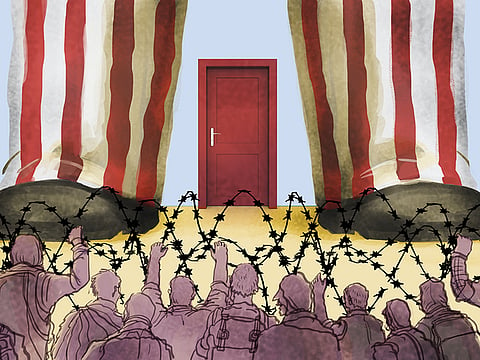Obama’s debt to the huddled masses
The case for the US to open its doors to many more Syrians is compelling. It can do little else

When historians weigh the US President Barack Obama’s record, the word Syria looks set to be a negative. It is four years since Obama called for Bashar Al Assad’s ejection from power. The US president did almost nothing to follow through on it — and the little he tried arguably tightened Al Assad’s grip. More than 200,000 deaths and 4 million refugees later, it is hard to distinguish America’s response from that of other Western democracies. With the notable exceptions of Germany and Sweden, the west has denied succour to Syria’s fleeing masses.
Obama should be wary. Syria is not some footnote to a respectable diplomatic legacy. It is an indictment.
America’s abstention so far from Syria’s human crisis can be measured in numbers. Germany has put its European neighbours to shame by saying it will process up to 800,000 refugee applications from Syria — a multiple of the rest of Europe put together. Since the start of Syria’s civil war, the US has taken just 1,434.
There was a period when the US was deporting more Mexican immigrants than that every day. Money only goes so far to make up. The US has spent $4 billion on humanitarian relief, which is considerably more than Europe. But it pales against the costs Syria’s neighbours are bearing. One in five people in Lebanon is now a Syrian refugee. Turkey is overwhelmed.
The case for the US to open its doors to many more Syrians is compelling. First, there is little else the US can do to alleviate Syria’s suffering. As Obama discovered, calling for Al Assad’s departure is not the same thing as bringing it about. That was then.
Today, it is unclear whether Al Assad’s ejection would even be desirable. The revenge of Daesh (the self-proclaimed Islamic State of Iraq and the Levant) against Alawite and other non-Sunni supporters of the Al Assad regime could put today’s slaughter into the shade. Nor is there the slightest chance the US-led training of the moderate Syrian Free Army will produce an effective force before Obama leaves office. The US-led bombing campaign may stem the human exodus in some parts of Syria — Daesh has generated as many refugees as Al Assad. But it will not lead to a political settlement.
Second, America’s brand in the Middle East is as tarnished under Obama as it was under George W Bush. It may be unfair to compare them. Bush’s were errors of commission — chiefly in his Iraq invasion. Obama’s are errors of omission in how he has handled Bush’s legacy. But their costs are real.
No region is an island
The feeling — once articulated by the president himself — that the US could disentangle itself is mocked every day by the hordes escaping Syria and elsewhere. The spillover does not stop at Europe. In today’s world no region is an island, let alone the Middle East. The moral case for the US to accept more asylum seekers is long overdue. Since the 2003 invasion, the US has taken 157,000 Iraqis and a fraction the number of Afghans.
Thousands of those who worked for the US military, as interpreters, guides, and fixers, have failed to get visas — even though their lives are in danger from Daesh, the Taliban and others. The Obama administration deserves some blame for this. The special visa for former Iraqi and Afghan employees of the US military only came into effect in 2008. For those who have made it to the US, the process took years. For those left stranded, the message is clear: America is capable of abandoning you. It is hard to think of a worse signal, or one more easily rectified.
In this case, US politics is not to blame. Congress has passed laws with large bipartisan majorities to allow former Iraqi and Afghan employees into the country.
The problem is bureaucratic constipation. The fear of letting in one terrorist clearly outweighs the benefit of letting in thousands of deserving innocents. Applicants must wade through a morass of the State Department, the Department of Homeland Security, the Federal Bureau of Investigation and others. The hold up is in the executive branch. Only Obama has the power to unclog it. Likewise, only he has the power to take the lead on the Syrian refugee crisis. What is stopping him? Again, it is not politics. Evangelical groups have called on the US to take in more Syrian Christians, who make up a large share of Daesh victims. A group of senators urged Obama this year to take in 65,000 Syrian refugees of whatever background.
Obama’s response was to say the US would take in up to 8,000 more in 2016, a number too paltry to have much effect. Even Donald Trump, an aspirant for the Republican presidential candidacy, said last week that an exception could be made for Syria because its crisis was “so horrible”. The human cost is there on our smart phones. It is worth noting that Steve Jobs, Apple’s founder, was the son of a Syrian immigrant.
It is clear Obama’s humanitarian instincts are strong. But he is standing back on Syria. Whenever Bill Clinton is asked about his presidential regrets, he brings up his failure to stop the 1994 genocide in Rwanda. Unless Obama changes tack, Syria will come to haunt him too.
— Financial Times
Sign up for the Daily Briefing
Get the latest news and updates straight to your inbox



